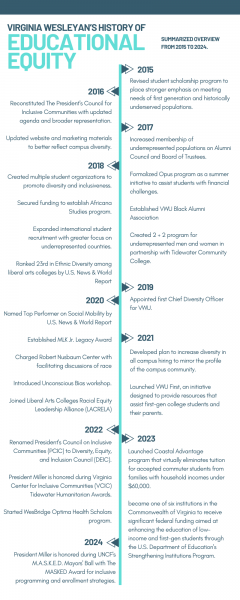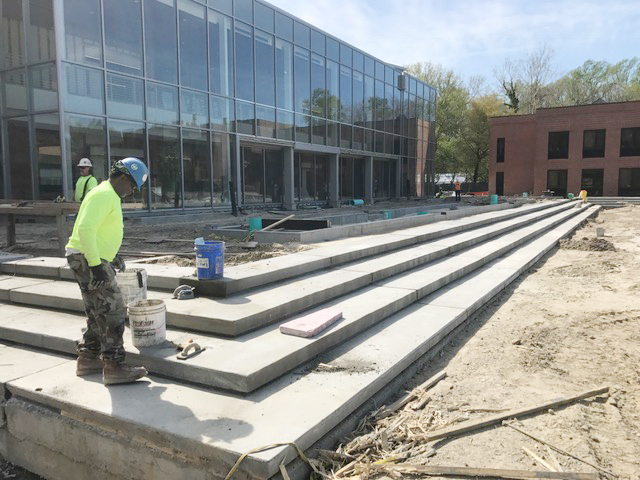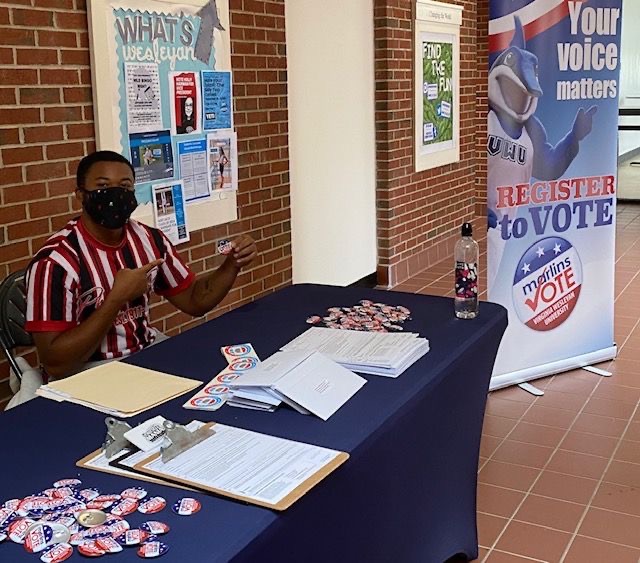Information is sourced from VWU website page entitled “Building A Campus
Culture Of Diversity And Inclusion.”
Lily Reslink|Marlin Chronicle
In light of President Scott D. Miller being among several honorees at the 2024 Hampton Roads United Negro College Fund (UNCF) Mayors’ Masked Ball for the university’s efforts in educational equity, voices across campus shared their perspectives.
The ball is a fundraiser and celebration that, according to the UNCF website, “[focuses] on raising public awareness and large corporate and individual donations to support deserving students through UNCF.” The event, which took place at the Virginia Beach Convention Center on March 6, is one of many hosted across the nation by the organization.
The UNCF mission statement reads, “UNCF envisions a nation where all Americans have equal access to a college education that prepares them for rich intellectual lives, competitive and fulfilling careers, engaged citizenship and service to our nation.”
This aligns with the Diversity, Equity and Inclusion (DEI) statements that VWU has across its website and other media.
A statement from Miller on the DEI section of VWU’s website reads, “We try to be leaders in the area of diversity and inclusion for Coastal Virginia.”
Two weeks after the Feb. 12 news release on the UNCF recognition, Miller announced that he was extending his contract through 2029 in the Feb. 26 Nota Bene.
Junior Judah King, president of the Black Student Union (BSU), provided his perspective on the recognition. “It broadcasts that the university is going in the right direction,” King said.
Students have also put forth suggestions for improvement. Junior Dominique Tatum said the school could benefit from being “more open to student feedback.”
King elaborated on this statement. “We’re the ones pursuing an education, so I believe that we should have a more active role in deciding what that looks like,” he said.
King acknowledged the existence of platforms that allow students to speak up, as well as the roadblocks that may impact their effectiveness. “I know there have been opportunities for students to voice their opinions, but can’t because the time of the opportunity may conflict with their schedule,” King said. “It has to be at a time and place when and where students are available and able to come and voice their opinions.”
According to the 13News Now coverage of Miller’s UNCF recognition, Miller said, “Having tremendously diverse communities within five miles of this campus, it’s our role as the major private institution in Virginia Beach to take a leadership role in working with the community to further that diversity and discussion.”
Despite what King deemed as a positive environment, he explained challenges he has encountered in his time at the university. “I will admit that this campus is very inclusive, and this is a very safe and welcoming space for students,” King said. “But there are instances where people have come to me frustrated, as the president of [BSU], because they were discriminated against and they didn’t feel supported.”
That being said, King said that these achievements and recognitions toward the school do mirror some progress that he’s taken note of.
Since he was a first-year, King said he has noticed an increase in racial diversity in incoming classes, an observation that others agree with.
Sophomore Kyla Robberect said she’s noticed more diversity on campus now compared to when she first toured VWU during her freshman year of high school.
According to the university news release on the UNCF recognition, “Currently, 22.4% of VWU’s study body is African American, many of which are first generation college students.”

President Miller attended the Masked Ball alongside Norfolk Mayor Kenny
Alexander, U.S. Congressman Bobby Scott and Hampton Mayor Donnie Tuck.
VWU Flickr|Courtesy
The university has enacted several policies and programs with the intention of increasing accessibility and fostering greater diversity.
Some examples that this news release highlighted include a student scholarship program focused on “meeting the needs of first generation and historically underserved and disenfranchised populations,” joining the Liberal Arts Colleges Racial Equity Leadership Alliance (LACRELA) and introducing the Coastal Advantage program that covers tuition for qualifying commuter students with household incomes below $60,000.
In another DEI-focused effort, VWU Global Campus and the Virginia African American Cultural Center (VAACC) partnered to produce the lecture series “Unity in Knowledge.”
As a part of this, Dr. Jeffery Toussaint, chair of Sociology and Criminal Justice, led the workshop, “Getting to the Bottom of Critical Race Theory Controversies & Understanding Its Importance,” on Feb. 21 at the Williams Farm Recreation Center.
Toussaint credited Dr. Deidre Gonsalves-Jackson, dean of Virginia Wesleyan University Global Campus and professor of Biology, for setting up this series. Gonsalves-Jackson helped kick off the series with the presentation entitled, “Using Diversity to Promote Diversity in STEM.”
Having participated in it, Toussaint spoke on the benefits of the series. “It’s bringing academia to folks who may not have access to people who discuss these things from an academic position,” Toussaint said. He said that the series helped to address the question of, “How can we use knowledge to actually impact and shape people’s lives in the real world?”
An obstacle to maximizing the reach of these lectures, Toussaint said, is that the people in attendance are unlikely to be the ones who would be most influenced by them. He called it “preaching to the choir,” and said that the “million dollar question” is how to get the message to people who are less inclined to seek it out.
In terms of addressing issues that concern DEI, Toussaint pointed to the bigger picture. “Wesleyan is just a part of every other higher education institution,” Toussaint said. “All these higher education institutions are a reflection of our society, right, so this is a structural problem, not an individual institutional issue.”
Although Toussaint does not undermine the importance of individual responsibility, he said many problems are embedded into larger societal structures.
Regarding the state of DEI at Virginia Wesleyan, King said, “I do think that we’re doing good, but we could do better.”
According to the website, constant improvement is part of the plan: “We are committed to continual efforts to build a community that is not only welcoming and supportive of all, but that also empowers all members of the Virginia Wesleyan family to have a voice and to be advocates for themselves and for each other.”
Beginning in 2020, the university outlined a plan to 2030 entitled, “Forging our Future: Building on Strength 2020-2030.” One of the plan’s core values is fostering an “Inclusive and Caring Community that empowers members to form meaningful relationships through listening, understanding, and communication,” indicating that DEI is on the long-term radar for the university.
By Lily Reslink
lbreslink@vwu.edu



